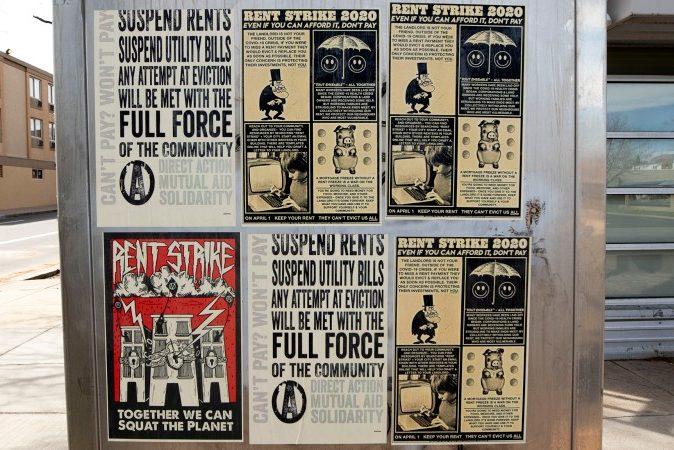
A grassroots group in Colorado has a message for state leaders: We’re not paying rent until the COVID-19 crisis is over. They say the sudden loss of income has made it impossible.
“We're working on [either] a rent strike or a rent freeze, and our leaders are going to have to choose which one it is,” said Desiree Kane of Estes Park.
Kane is a consultant who works in event planning. When COVID-19 hit the state, she watched as contract gig after gig got canceled.
“Over the course of days, all of my income went to zero,” Kane said. “And it was happening to a bunch of my friends.”
Kane sent a text message to six of her friends — all were in similar situation. That turned into a statewide movement called Colorado Rent Strike and Eviction Defense. Kane says they have organizers in every major city in Colorado and their Facebook group has grown to over three thousand members.

The group has backed a petition that demands, among other actions, a statewide freeze — not a deferment — on collections of rent, mortgages, and utilities.
Gov. Jared Polis’ administration is identifying “all lawful means to give tenants a reprieve from actions that would remove them from their homes and impose penalties for late or non-payment of rent,” according to a statement from a spokesperson.
But so far, Polis has not called for a statewide rent freeze.
With non-essential businesses shuttered, Colorado’s economy has come screeching to a halt.
More than 80,000 unemployment claims have been processed in Colorado, and Kane said she thinks people’s survival instincts are starting to kick in.
“Do I starve to death or do I fight with my landlord?” she asked.
Some landlords do rely on rental income for their own mortgages. They navigate this new reality carefully.
For Cat Lichtenbelt, a landlord who lives in Ridgeway, it wasn’t a hard choice.
“I cannot buy groceries for everybody in town,” Lichtenbelt said. “But [there are a] few people that I can impact in a positive way.”
Lichtenbelt owns several residential properties and one commercial property in two different counties. Both rely heavily on tourism.
When it became clear that COVID-19 would drastically impact business, she reduced her tenants’ rent significantly. For the next three months, they’ll each pay her a total of three dollars.
After that, she'll reevaluate what everything looks like.
She says she’s able to swing this partly because her husband’s income has not been impacted by the COVID-19 pandemic. They don’t live paycheck to paycheck like some of their tenants do.

“And for us, it's gonna be a hit, but it's not going to be as devastating as [for] a lot of other people," she said.
Lichtenbelt likened trying to collect rent at this time to trying to get milk from a carrot. She understands that some small landlords rely on their rental income for their livelihood.
“So at some point,” she said. “There needs to be sort of grace.”
Lichtenbelt said she would support a statewide rent and mortgage freeze.
Other landlords claim they have no choice but to keep collecting rent.
Schuyler Trowbridge of Longmont shared a photo of a letter he received from his landlord after he told him he would not be able to pay rent for April. Trowbridge recently lost his job at a call center.
His landlord apologized, but said he relies on rental income to pay his mortgage and homeowners association fees.

Trowbridge said that after some back and forth, his landlord agreed to adjust rent for April and May, and then revisit it.
On April first, Trowbridge paid $250 of the $650 he owed.
“The first thing that we need to stop this pandemic is safe, affordable housing,” he said.
Joseph Mease supports the idea of a rent and mortgage freeze. He owns several long-term rentals in the Denver area and two short-term vacation rentals in tourism-heavy Grand County.
“An immediate short-term freeze on what I owe the banks would give me the flexibility to dramatically reduce my monthly expenses,” he said. “And in turn, I could pass that savings on to my tenants who need it the most.”
Mease says a national freeze — not just individual states ones — is what may be needed.
“If only some states participate [in a freeze],” he said. “It could cause chaos and confusion [for] banks that have borrowers across state lines.”
President Trump has implemented a nationwide suspension on evictions, but a federal freeze on rent and mortgages is not on the radar.
Editor's note: The previous version of this story has been updated to correct the name of Grand County.









